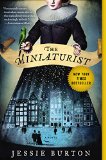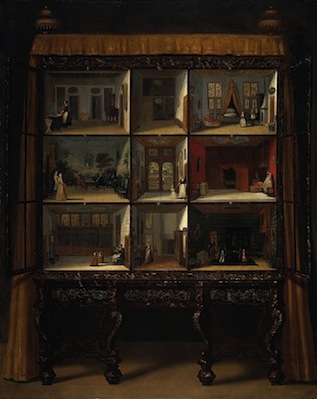Summary | Excerpt | Reading Guide | Reviews | Beyond the Book | Read-Alikes | Genres & Themes | Author Bio

This article relates to The Miniaturist
Like Nella in The Miniaturist, the real Petronella Oortman ordered a cabinet house to be made in 1686 to the exact scale of her own home. It can still be seen today in the Rijksmuseum in Amsterdam. Petronella's cabinet house was elaborate, gilded with silver and inlaid with tortoise shell, but this was not a unique purchase for a woman of her time.
 Both wealthy men and women in 17th century Amsterdam kept cabinets full of exquisite trinkets to celebrate their status. Men's cabinets were usually called curiosity or wonder cabinets. They displayed items from anywhere in the world the Dutch traded. Women's cabinets were oversized dollhouses, but were certainly not toys. While a man's cabinet exhibited the bounty of Amsterdam's success in trade and international relations, a woman's exalted the beauty and order of the home. Still, a woman's cabinet was no less exotic than a man's. Just as Petronella's husband would have included items from Asia in his cabinet, her cabinet house boasted miniature porcelain plates imported from China. The pieces of furniture and accessories in the home were not the only focus. The physical decoration of the cabinet house was also important. Petronella's contained marble floors in the front entryway and murals created by famous Dutch artists Willem Frederiksz van Royen and Nicholaas Piemont. When the house was on display, the front door could be opened to show a full garden, complete with working fountain and pump. The copper pump in the kitchen was even functional.
Both wealthy men and women in 17th century Amsterdam kept cabinets full of exquisite trinkets to celebrate their status. Men's cabinets were usually called curiosity or wonder cabinets. They displayed items from anywhere in the world the Dutch traded. Women's cabinets were oversized dollhouses, but were certainly not toys. While a man's cabinet exhibited the bounty of Amsterdam's success in trade and international relations, a woman's exalted the beauty and order of the home. Still, a woman's cabinet was no less exotic than a man's. Just as Petronella's husband would have included items from Asia in his cabinet, her cabinet house boasted miniature porcelain plates imported from China. The pieces of furniture and accessories in the home were not the only focus. The physical decoration of the cabinet house was also important. Petronella's contained marble floors in the front entryway and murals created by famous Dutch artists Willem Frederiksz van Royen and Nicholaas Piemont. When the house was on display, the front door could be opened to show a full garden, complete with working fountain and pump. The copper pump in the kitchen was even functional.
Petronella purchased the house for twenty thousand guilders, the equivalent cost of an average-sized family home in today's dollars.
Petronella Oortman's cabinet house, courtesy of Jacob Appel
Filed under Cultural Curiosities
![]() This "beyond the book article" relates to The Miniaturist. It originally ran in September 2014 and has been updated for the
June 2015 paperback edition.
Go to magazine.
This "beyond the book article" relates to The Miniaturist. It originally ran in September 2014 and has been updated for the
June 2015 paperback edition.
Go to magazine.
Great literature cannot grow from a neglected or impoverished soil...
Click Here to find out who said this, as well as discovering other famous literary quotes!
Your guide toexceptional books
BookBrowse seeks out and recommends the best in contemporary fiction and nonfiction—books that not only engage and entertain but also deepen our understanding of ourselves and the world around us.